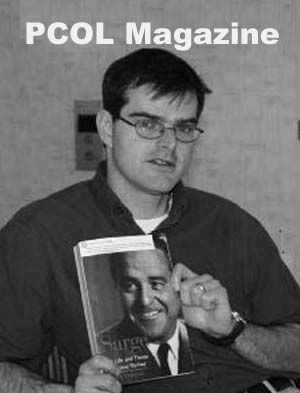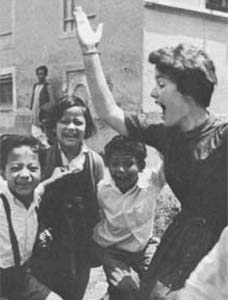
Scott Stossell writes about "The Daddy Dilemna"
The daddy dilemma
Bookstores and newsstands are awash with tales of the overworked, stressed-out, angst-ridden modern mom. What’s a modern dad to do?
By Scott Stossel | May 8, 2005
SOME NIGHTS, after our daughter has been tucked into bed, my wife and I settle down in front of the television to watch some adult entertainment. No, not that kind. I’m talking about ‘‘Supernanny.’’
Monday nights at 10 p.m. on ABC, Supernanny Jo Frost descends into a family’s miasma of dysfunction to impose order on domestic confusion and bring unruly children to heel. One evening I suggested that the show’s compulsive appeal to us had something to do with the pleasure of seeing household anarchy eradicated by Jo’s stern command. ‘‘No, that’s not it,’’ my wife said. ‘‘We just like it because the families are more disorganized than we are.’’ She’s right: There is a thrill to be derived from peering into households even more hapless and chaotic than our own.
This helps account also for the great popularity of ‘‘Desperate Housewives.’’ The moments on that show that resonate are not the soap-opera style plot twists but rather the acute observations about the burdens of parenthood embodied in the lurid tales of nanny-poaching and Ritalin-popping. The show has set off angry debates among feminists, as evidenced by a pair of dueling cover stories in Ms. magazine: Is ‘‘Housewives,’’ with its stay-at-home moms and retrograde cultural attitudes, an exercise in reactionary anti-feminism? Or is it a send-up of those attitudes - or even, with its evocations of sisterly bonding and predatory female sexuality, a pro-feminist celebration?
Though I follow these debates with great interest, I tend do so as a passive spectator rather than as an active participant. As a man, after all, the issues raised by, say, the travails of Felicity Huffman’s ‘‘Housewives’’ character Lynette Scavo - who gave up a successful career to raise her kids - are not of direct concern to me.
Or are they? Obviously, whether my wife works or not affects her life significantly - but it affects mine significantly too. If she works, the family has more income, which is increasingly a necessity for most families - and not just in high-priced areas like Boston. If she works she will also be likely to feel more competent and have higher self-esteem, according to an oft-cited University of Michigan study. Higher self-esteem, some psychologists argue, leads to better parenting.
But if she works, she will also have less time - less time for leisure, but also less time for cooking and cleaning and parenting and the myriad other ‘‘domestic duties’’ associated with the oppressive Feminine Mystique. And some research has shown that if she works my own income will actually decrease.
Of course, working women’s incomes are depressed simply by dint of their being female, and having children only compounds the problem. Mothers tend to have lower salaries, fewer opportunities for promotion, and are generally more likely than fathers to be relegated to second-class ‘‘mommy track’’ career paths. Feminists are clearly right in observing that the American workplace is still rife with double standards. But men face their own double standards. If my wife chooses to stay home with our daughter, for example, she’s fulfilling her calling as a mother; if I ‘‘choose’’ to, I’m being unmanly, or just rationalizing my unemployment.
Over the last few years, a raft of new books has tried to address some of these issues, primarily from the woman’s perspective. (A small sampling of titles: ‘‘Creating a Life: Professional Women and the Quest for Children’’; ‘‘The Truth Behind the Mommy Wars: Who Decides What Makes a Good Mother?’’; and ‘‘The Mommy Myth: The Idealization of Motherhood and How it Has Undermined Motherhood.’’) Such books wrestle with gender bias, work-family issues, and the so-called ‘‘Mommy Wars’’ - those literary shouting matches which at their extreme pit working mothers (who argue that stay-at-home moms are betraying 40 years of feminist advances) against stay-at-home moms (who argue that working moms are betraying their children).
ADVERTISEMENT
And yet lurking beneath all this is a deeper, almost existential frustration: the abiding anxiety of motherhood itself.
If these books are any indication, despite decades of feminist consciousness-raising, women seem to feel they have bumped up against the limitations of both biology (men still can’t bear children, or breast-feed) and culturenamely, the seemingly conflicting expectations that women can not only ‘‘bring home the bacon and fry it up in a pan’’ but also be perfect mothers to their children. The most impassioned expression of this view arrived this spring, in the form of Judith Warner’s ‘‘Perfect Madness: Motherhood in the Age of Anxiety’’ (Riverhead), which, despite the many negative reviews, seems to be on track to supplant Betty Friedan’s ‘‘The Feminine Mystique’’ as the emblematic lament of the modern woman.
Mommy lit is written by and for women - and, it has to be said, women of a certain class (Warner, for example, writes almost exclusively about relatively affluent mothers in the Washington, D.C., area). As a relatively new father myself (my daughter is 20 months old), I see these books and watch ‘‘Desperate Housewives’’ and wonder what role we men play - even those of us who think ourselves enlightenedin this litany of motherly frustrations. Are we seen as sympathetic sharers in the parental angst? Or are we, despite our good intentions, the cause of it?
As I read Warner’s book, and dipped into others in the genre - including Allison Pearson’s 2002 novel ‘‘I Don’t Know How She Does It,’’ whose hot pink book jacket earned me some curious looks on the subwayI felt a little bit like I’d wandered into the ladies rest-room: All the talk of ‘‘we women’’ and ‘‘our bodies’’ and ‘‘sisterhood’’ made it clear that I was not the intended audience. But what clearly came through is that the mothers in these books, both working and non-working, are feeling a miserable Lynette Scavo-like angst at their predicament, a pervasive sense that nothing is ever good enough: The cookies are not homemade enough, the family is not rich enough, the house is not clean enough, the kids’ interactive playtime is not enriching enough. Our culture’s expectations of motherhood, in other words, are driving these women insane.
Much of Warner’s book is overheated and polemical, but it does contain some fascinating material. For instance, Warner serves up some useful reminders that, for all the many problems and contradictions inherent in society’s understanding of motherhood, we really have come a long way, baby. Here’s an excerpt from a ‘‘Memo to American Women’’ that appeared in Look, a mass-circulation magazine, in 1966: ‘‘Your husband cannot habitually cope with laundry, supper, blowing the children’s nosesand keep his masculinity.... If you are determined to take on the responsibilities of an executive position, you must be just as willing to help your child with his homework and cook (or plan) your husband’s dinner, or you will be a failure as a woman, and therefore, as a human being.’’
ADVERTISEMENT
Reading not-so-ancient cultural artifacts like this, it’s no wonder there is still so much lingering feminist resentment toward men. Especially since not all of the injustice is historical. According to data published in The Journal of Family Studies, working mothers still do more than 70 percent of the housework.
One unspoken implication in all this - and sometimes, at least in our family, the spoken implication - is that the ‘‘perfect madness’’ of modern motherhood is partly men’s fault. ‘‘Researchers say that 55 percent of men actually start spending more time at work after they become fathers,’’ Warner writes. ‘‘They work longer hours than is strictly necessary. They hang around the office just late enough to ensure that, when they get home, the kids will be in bed and the kitchen will be cleaned up.’’
(Elsewhere in the book, however, Warner cites the work of UC-Berkeley sociologist Arlie Russell Hochschild, who in her 1997 book ‘‘The Time Bind’’ reported that women, too, choose to spend more hours at the office than is strictly necessary in order to escape the demands of family life.)
But what I took away from Warner’s book was mainly this: Maybe I’m not so bad after all, at least in relative terms. The interviews Warner excerpts in her facetiously titled ‘‘Wonderful Husbands’’ chapter were a great relief for me to read. ‘‘There’s a learned incompetence that sets in,’’ says one woman of her husband. ‘‘I think: If you did things at work in such a dufus-y way, you wouldn’t be having a career.’’ Said another: ‘‘TV is a better baby-sitter than Daddy, any day.’’ While I was reading this chapter, I found myself phoning my wife every few paragraphs or so, to read her another passage. ‘‘OK, OK, I get it, you could be worse,’’ she said. ‘‘Now shut up and stop calling me.’’
Warner says she was prompted to write her book because the ‘‘moms I knew were stressed to the breaking point, looking tired and haggard and old.’’ She should see some of the dads I know. (I have been known to show up at the office with spit-up in my hair, staggering around blearily after another sleepless night.) This is not to dispute that women generally get the much shorter end of the child-rearing stick. But we would all, men and women alike, be well served -- as Warner suggests -- by government policies (such as more high-quality, federally funded child care) that make achieving that elusive ‘‘work-life balance’’ easier.
Even federally subsidized day care, however, is unlikely to eliminate the angst many mothers (and fathers) feel over ‘‘abandoning’’ their young children to the care of others, or to settle arguments about who does how much housework. In the end, there may be no entirely satisfying solution to the problems laid out in mommy lit. But for what it’s worth, I’m trying to help ease my wife’s transition back to full-time work. So far, I’m afraid, I’m doing a poor job of it: I wrote this essay instead of putting my daughter to bed this week.
Scott Stossel is a senior editor of The Atlantic Monthly and the author of ‘‘Sarge: The Life and Times of Sargent Shriver.’’
© Copyright 2005 Globe Newspaper Company.









